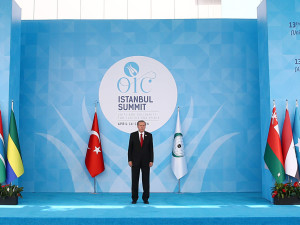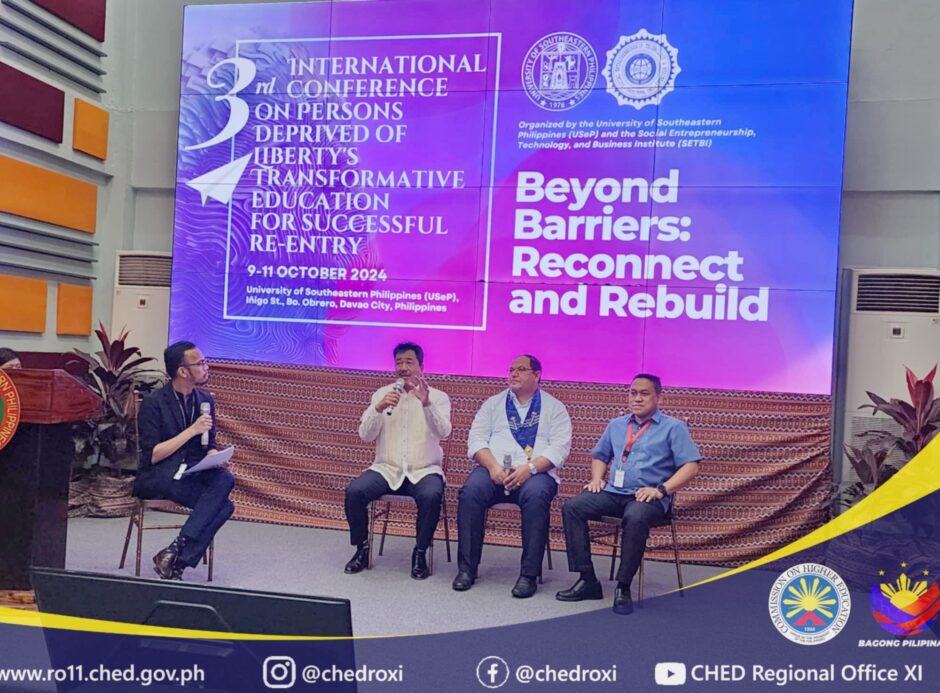
Turkey's President Recep Tayyip Erdogan waits for the arrivals of leaders and representatives of the Islamic countries before the opening of the 13th Organization of Islamic Cooperation, OIC, Summit in Istanbul, Thursday, April 14, 2016. Turkey hosts the two-day 13th OIC Summit with presidents, prime ministers and ministers attending to discuss several issues.(Presidential
The leaders of the Islamic world met at their 13th Session of the Islamic Summit Conference in Istanbul as the Muslims of the world face their greatest challenge in history. The Summit ended last week with Turkey’s Erdoğan becoming the term president. Muslims have lost their sense of nationalism, which was and still is the hallmark of the Islamic ideology. The Muslim world faces huge changes within; Iran is in a proxy war with Saudi Arabia in Yemen and Syria; Turkey is at war with the Kurds in Syria, Iraq, Libya, and Turkey; and Iraq is fighting the Kurds-- all with Muslims killing Muslims. As of now the Shia-Sunni conflict is of primary importance, but the Organization of Islamic Cooperation (OIC) failed to take any measure to stop the killing.
One wonders who will rise to take steps to resolve these problems that Islam is facing. The theme for this 13th Summit was “unity and solidarity for justice and peace.” The question is how will they achieve that solidarity and unity? I believe that when Prophet Mohammad died, Islam died with it. The same problem of a power struggle between the two sects of Islam has continued unabated until today. Who will address this competition for power? The OIC is the second largest inter-governmental organization in the world after the United Nations (UN). A charter founded it in 1969 with 57 members across four continents. The OIC partners with every specialized UN agency, government, and civil society organization to address the problems and concerns related to its member states and to Muslims around the globe.
However, when it comes to its policymaking, decision-making and trade capacity, it is not very effective. Out of the 57 members of OIC, many are among the poorest countries in the world. Some of the countries could not even pay their membership fees. The average national income is very low. Most of the OIC member states lack a stable government and are faced with war, coups, or dictatorial systems of government. In 2015, the OIC adopted a ten-year plan to address problems such as economic inequality, terrorism, poor governance, and Islamophobia. The OIC also tried to be active in humanitarian assistance and established the Islamic Cooperation Humanitarian Organization, but the problem is that there are more than 73 million unemployed young people living in OIC countries, and more than 350 million people live in poverty, lack an education, and experience hunger, diseases, gender inequality, and lack of access to clean water. In spite of these horrendous problems, fundamentalist terrorism is the biggest challenge Muslims face.
Historically, the biggest problem facing the OIC was its ability to establish a consensus amongst its members. The OIC does not have a very extensive record of accomplishments. The organization needs to create a common market with commercially integrated countries and free movement of goods and people, such as the European Union has accomplished. But it is sad to say that the OIC has become a club that prizes ceremony. The main charter of the OIC is to promote member states and to support good governance, democracy, human rights, freedom from terrorism, rule of law, and an improved livings standard for the people of the Islamic world. Yet, they have made little gains and lost much.
The OIC is facing the urgent need to improve equality, to bring justice, and to promote democracy. When it comes to lecturing the rest of the world, Muslims will argue that Islam is a religion of justice and peace. But the question is how can we talk of justice when some Muslim countries live a life of luxuries while the rest live in misery and poverty? Muslims will say Islam is a religion of peace, but why is so hard to accomplish peace even amongst themselves and to stop the bloodshed of people its people? The OIC should realize their dependence on Western support and move forward to build their own capabilities and solve their own urgent problems. Labeling themselves as “The Collective Voice of the Muslim World,” the OIC should have issued in their final communique a plan to eradicate terrorism, economic deficit, and extreme interpretations of Islam by Sunni and Shite groups who justify the use of violence against each other.
Dr. Aland Mizell is President of the MCI and a regular contributor to Mindanao Times. You may email the author at:aland_mizell2@hotmail.com

